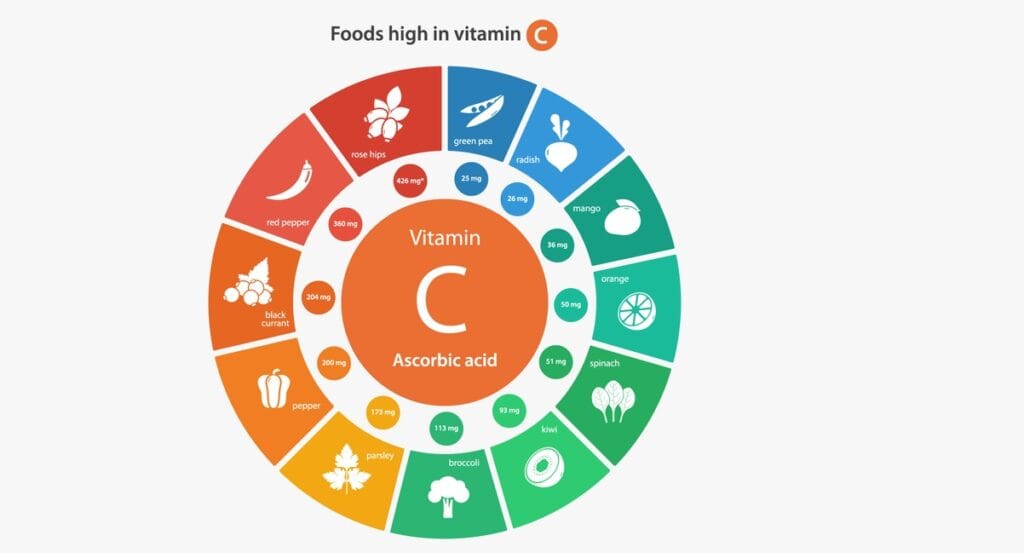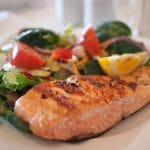Vitamin C, also known as ascorbic acid, is an essential nutrient vital for numerous bodily functions, including the maintenance of skin, blood vessels, bones, and cartilage. It’s also a potent antioxidant that helps protect cells from damage by free radicals. For those on a ketogenic diet, finding sources of vitamin C that align with low-carb requirements can be challenging, as many traditional sources of this vitamin are fruits and vegetables high in carbohydrates. This guide explores the importance of vitamin C and provides a detailed list of Keto Food Sources of Vitamin C to help you meet your nutritional needs without compromising your ketogenic lifestyle.
Importance of Vitamin C
1. Boosts Immune Function
Vitamin C plays a crucial role in boosting the immune system by supporting various cellular functions. It enhances the production and function of white blood cells, which are essential for fighting infections. Regular intake of Keto Food Sources of Vitamin C can help reduce the duration and severity of colds and other infections.
2. Antioxidant Properties
As a powerful antioxidant, vitamin C protects cells from oxidative stress caused by free radicals. This protection is essential in preventing chronic diseases such as heart disease, cancer, and diabetes. For those on a ketogenic diet, where fat intake is high, antioxidants are particularly important in reducing the oxidative stress associated with lipid metabolism.
3. Collagen Production
Vitamin C is necessary for the synthesis of collagen, a protein that is crucial for the structure of skin, cartilage, tendons, ligaments, and blood vessels. Collagen production is essential for wound healing and maintaining skin elasticity, making vitamin C a vital component of overall health.
4. Improves Iron Absorption
Vitamin C enhances the absorption of non-heme iron, the type of iron found in plant-based foods. For individuals on a ketogenic diet, this can be particularly beneficial, as many keto-friendly vegetables are also good sources of iron.
5. Supports Cardiovascular Health
Vitamin C contributes to cardiovascular health by promoting healthy blood vessels, reducing blood pressure, and improving overall heart function. Its role in collagen synthesis helps maintain the elasticity of arteries, reducing the risk of heart disease.
Keto Food Sources of Vitamin C
1. Bell Peppers
Bell peppers, particularly green and red varieties, are rich in vitamin C and low in carbs, making them an excellent choice for those on a ketogenic diet. One medium bell pepper contains about 120-190 mg of vitamin C and only 5-6 grams of net carbs.
- Usage Tips: Add chopped bell peppers to salads, stir-fries, or as a crunchy snack with a low-carb dip.
2. Kale
Kale is a nutrient-dense leafy green that provides a substantial amount of vitamin C along with other essential vitamins and minerals. A 100-gram serving of kale offers about 120 mg of vitamin C and around 5 grams of net carbs.
- Usage Tips: Incorporate kale into smoothies, salads, or keto-friendly soups for an extra boost of nutrients.
3. Broccoli
Broccoli is a cruciferous vegetable that is both low in carbs and high in vitamin C. A 100-gram serving of broccoli contains approximately 90 mg of vitamin C and only 4 grams of net carbs.
- Usage Tips: Enjoy broccoli steamed, roasted, or stir-fried with garlic and olive oil for a tasty, vitamin C-rich side dish.
4. Cauliflower
Cauliflower is another versatile, low-carb vegetable that is high in vitamin C. A 100-gram serving of cauliflower provides around 48 mg of vitamin C and 3 grams of net carbs.
- Usage Tips: Use cauliflower to make keto-friendly rice, pizza crusts, or mashed “potatoes” to enjoy its benefits in various dishes.
5. Spinach
Spinach is a leafy green that offers a moderate amount of vitamin C along with a host of other nutrients. A 100-gram serving of spinach provides about 28 mg of vitamin C and 1 gram of net carbs.
- Usage Tips: Add spinach to salads, smoothies, or sauté it with garlic for a quick and nutritious side dish.
6. Brussels Sprouts
Brussels sprouts are a cruciferous vegetable that provides a good amount of vitamin C and fits well into a keto diet. A 100-gram serving contains about 85 mg of vitamin C and 5 grams of net carbs.
- Usage Tips: Roast Brussels sprouts with olive oil and bacon for a delicious, keto-friendly side dish.
7. Zucchini
Zucchini is a low-carb vegetable that offers a modest amount of vitamin C. A 100-gram serving contains approximately 17 mg of vitamin C and 3 grams of net carbs.
- Usage Tips: Use zucchini in stir-fries, zoodles (zucchini noodles), or as a grilled side dish to enjoy its health benefits.
8. Asparagus
Asparagus is a low-carb vegetable that provides vitamin C and is a great addition to a ketogenic diet. A 100-gram serving of asparagus offers about 5.6 mg of vitamin C and 2 grams of net carbs.
- Usage Tips: Grill, roast, or steam asparagus with a drizzle of olive oil and seasoning for a simple, nutrient-rich side.
9. Cabbage
Cabbage is a keto-friendly vegetable that is high in Keto Food Sources of Vitamin C and low in carbohydrates. A 100-gram serving of cabbage contains around 37 mg of vitamin C and 3 grams of net carbs.
- Usage Tips: Incorporate cabbage into salads, soups, or use it as a low-carb wrap alternative.
10. Swiss Chard
Swiss chard is a leafy green vegetable that provides a good amount of vitamin C and fits well into a ketogenic diet. A 100-gram serving of Swiss chard contains about 30 mg of vitamin C and 2 grams of net carbs.
- Usage Tips: Sauté Swiss chard with garlic and olive oil or add it to soups for extra flavor and nutrients.
Meeting Your Daily Vitamin C Needs on Keto
Meeting your Keto Food Sources of Vitamin C needs while on a ketogenic diet requires careful planning, as traditional sources like oranges and other citrus fruits are high in carbs. Incorporating a variety of low-carb vegetables that are rich in vitamin C can help ensure you get adequate amounts of this essential nutrient without disrupting ketosis.
You May Also Like: Vitamin D and Keto
Recommended Daily Allowance
The recommended daily allowance (RDA) for vitamin C varies by age, sex, and life stage, but generally, adults need about 65-90 mg per day. Smokers and individuals under high oxidative stress may require higher amounts.
Supplementation
If you find it challenging to meet your vitamin C needs through diet alone, consider a keto-friendly vitamin C supplement. Choose supplements that do not contain added sugars or fillers that could disrupt ketosis.
Cooking and Storage Tips
Vitamin C is sensitive to heat and light, so cooking methods such as steaming or microwaving vegetables can help retain their vitamin C content better than boiling. Store vegetables in a cool, dark place and consume them soon after purchase to maximize their nutritional value.
Conclusion
Ensuring adequate intake of vitamin C on a ketogenic diet is crucial for maintaining overall health, supporting the immune system, and protecting the body from oxidative stress. By incorporating a variety of keto-friendly vegetables rich in vitamin C, such as bell peppers, kale, and broccoli, you can easily meet your nutritional needs while staying in ketosis. Always consider the balance of your diet and, if necessary, consult with a healthcare professional to tailor your vitamin intake to your individual needs.
References
- National Institutes of Health (NIH). “Vitamin C – Fact Sheet for Consumers.”
https://ods.od.nih.gov/factsheets/VitaminC-Consumer/ - Mayo Clinic. “Vitamin C – Why you need it and where to find it.”
https://www.mayoclinic.org/healthy-lifestyle/nutrition-and-healthy-eating/expert-answers/vitamin-c/faq-20058030 - Healthline. “11 Foods High in Vitamin C.”
https://www.healthline.com/nutrition/vitamin-c-foods - Harvard T.H. Chan School of Public Health. “Vitamin C.”
https://www.hsph.harvard.edu/nutritionsource/vitamin-c/


